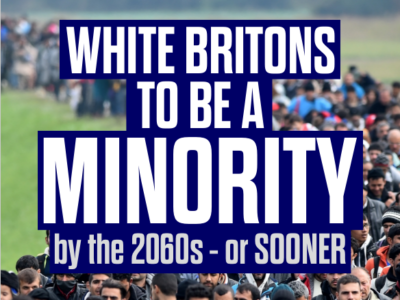Originally published by the White-Papers Policy Institute, 2022-02-16
Welcome to the fourth instalment of our latest project, published first on Telegram, and syndicated here on the Hyphen-Report. NJP Part One can be found here. We are reviewing the policies and political platforms of White Nationalist, Ethno-Nationalist and Pro-White political parties. And we are looking for practical answers to the broad question:
“How could our Nations actually be reformed? How could any of this be done”
But we believe it is helpful to re-state this question in more concrete and particular terms. In part two of the series we narrowed our focus to the United States of America, and asked:
“How could the United States of America be reformed according to the principles of White Nationalism? How could this be done, politically?”
In this series we have set strict limits on our political imagination – we are exploring ways in which the action plans of the organisations under review could be put to work within the current legal frameworks of their respective nations. In looking at what can be feasibly done within the American system, we took as our model of political action the manifesto of a viable contemporary organisation – the National Justice Party (NJP), led by Michael Peinovich. The NJP is one of the few organisations in the United States advocating for White Americans. And of these few, it is unique in being an organised political party with a large following.
Point Two of the NJP platform
- We demand the extension of the 1964 Civil Rights act to provide equal protections and privileges to the White majority, or the act must be repealed.
While White-Papers agrees readily with the sentiment behind this demand, in discussing further its political implementation we would run up against the self-imposed limits of our purview in this series. Such a policy could only be implemented by either an act of Congress or a clear and definitive ruling by the Supreme Court. We cannot, within the scope of the present article, write full length proposals for legislation or judicial opinion (though we do not rule out such a project for the future). What White-Papers CAN offer is background to this existential issue of White Identity Politics in America, by taking a look at the systemic anti-Whiteness that has led the NJP committee to make this demand for equal rights. And with the meta-political aim of education in mind, we present the following notes as potential material for a lesson in the realities of anti-White discrimination in America today. When such material is shared, it serves a broad educational purpose in awakening ordinary people in America and the Western World to the dispossession of Western peoples. And that is a first step toward the groundswell of a political wave that will create the conditions for radical constitutional changes in the Western Nations.

According to a 2017 NPR Poll over 55% of White Americans believe their race faces discrimination, most notably in employment, in the courts of law, and in university applications. And their beliefs are amply borne out by social reality: uniquely among all Races dwelling within the United States, the rights of White Americans, the historic majority and founding stock of the nation, are NOT protected under the 1964 Civil Rights act (Title VII), despite claims made to the contrary by the United States government.
Campus of Yale University
Anti-White Discrimination in College Applications
If we look first at the higher-education system, we see that the dice are loaded against young White Americans. The consequences of the decades-long normalisation of ‘Affirmative Action’ have been that intelligent young White people are effectively locked out of the institutions that were built for their cultivation and betterment. A 2020 investigation by the Trump administration’s Department of Justice concluded that Yale University discriminates against White applicants in their admissions process to such an extent that a White student has a mere one-tenth the chance of being offered a place when compared to a Black applicant. Rather than responding to these findings with legal action, the Department of Justice “demanded” that Yale alter their admissions process: not to remove all aspects of anti-White discrimination, but merely to comply with past Supreme Court rulings establishing that racial discrimination against White applicants should be “limited”. Yale declined to acquiesce to these demands, and no further action has been taken by the Department of Justice. An obvious question suggests itself: why do the purportedly ‘colour-blind’ provisions of Civil Rights act (Title VII) not apply to the White students discriminated against by the admissions practices of Yale?
For decades it has been a widely held assumption among Americans that higher-education provides a path to a career. It is certainly true that this can be one function of a good education. But not everyone can, or should, go to university. We would like to think that for the high-school leaver and the college graduate alike, there is a job available in modern America. And yet for White Americans the job market is NOT a level playing field. Both the National Justice Party and White-Papers take a robustly pro-worker position. And to be pro-worker is to be against unfair discrimination in hiring and firing. But just such discrimination is exactly what we see when we look at employment practices in America through a racial lens: in 1979, the Supreme Court ruling United Steelworkers V. Weber upheld that employers may favour racial minorities in hiring and training personnel. This ruling creates the iniquitous social reality that White American job seekers can be put at the back of the line if companies can justify their discriminatory hiring practices within the spirit of the law.
United States Supreme Court Building, AKA “The Marble Palace”
Anti-White Discrimination in the Courts
And the records of American courts reveal a litany of failed cases brought by White American plaintiffs, under Title VII, against discriminatory employers. One particularly pathetic example concerns a White woman who, after having previously won her case, then had her complaint dismissed as her evidence was determined to be“fumbling and bumbling”, the court finding it “improbable” that a jury could have comprehended it. Would such remarkable powers of retroactive mind-reading have been brought to bear had the plaintiff been non-White? White-Papers does not care to speculate, noting only that once more the provisions of the Civil Rights Act (Title VII) seem to have arbitrary limits that come to a halt wherever members of the White Race are found.
Are White Americans labouring under some sort of illusion when they complain that the civil courts are set against them? Is this just a pervasive sense of entitlement on the part of White people? Has White Privilege been up to its old tricks? Let’s find out: the reality is that when bringing discrimination suits before federal courts, White plaintiffs are subject to a HIGHER burden of proof than Non-White plaintiffs. This astonishing disparity arises from the application of a legal convention, the existence of which ordinary Americans might not be aware of, but which makes a mockery of their traditional rights: the McDonnell-Douglas burden-shifting framework.
‘McDonnell-Douglas’ may be explained simply: any non-White citizen or permanent resident of the United States who brings a discrimination suit is presumed to have a case (at least partly) by meeting one of four qualifying criteria which affirms their status as a racial minority. That is to say: the case is assumed to possess some level of validity simply because of the race of the plaintiff. White Americans are not extended this privilege as they are not considered a racial minority by the United States government, despite being a minority population in seven states and the District of Columbia. It would perhaps not be inappropriate to characterise the McConnell-Douglas Burden-Shifting Framework as a legal principle of ‘Affirmative Action’. For the White Americans discriminated against by this principle the provisions of the Civil Rights act (Title VII) mysteriously offer no aid or succour.
Mr. Warren Balogh, National Justice Party founding member and member of the NJP’s Council
We see a consistent picture: privileges extended to the minority races, discrimination against the White majority. Only by taking action to demonstrate to the White American people the disdain and hypocrisy of their ruling elites, and subsequently riding the wave of popular anger to a legislative, judicial and executive majority, can these discriminatory practices be ended. One of the few organizations with this expressed political goal is the National Justice Party. In truth, no one else currently active on the American political scene, of comparable organisation, popularity and passion, is tackling this issue head-on. It remains to be seen what NJP can achieve politically, but if identifying the right problems is ‘half-the-battle’, they have already laid some commendable groundwork.















This series is very well written and researched. I suggest a new platform review should explore the goals and purpose of the Northwest Front created by the late Harold Covington. They shut down in 2020 after their front man quit but last year they started back up under new leadership.
To anyone hoping to start research their website is:
northwestfront (dot) info
I’m not shilling for them but I do believe they are another interesting white identity group that warrants further exploration by White-Papers and the Hyphen-Report.
FYI: I know HR here are advocates for the NJP and the NJP borrows heavily their inspiration from the National Alliance and its founder Dr. William Luther Pierce. Harold Covington was extremely jealous of Dr. Pierce and butted heads with him including Covington libeling Pierce, they didn’t like each other one bit so maybe that animosity may effect your decision to write the article. Maybe that animosity could be woven into another article about how each man’s organization differed from the other based on a shared vision for white survival but different intended means for getting there. Especially by Harold Covington who intended above all else for his movement to eclipse the National Alliance (didn’t really work out that way.)
Thanks for commenting, I forwarded this to the writer